句型1-20
英语语法学习二十口诀
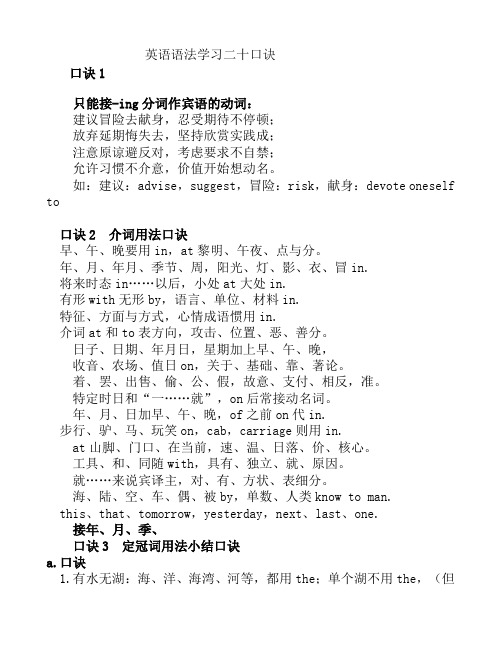
英语语法学习二十口诀口诀1只能接-ing分词作宾语的动词:建议冒险去献身,忍受期待不停顿;放弃延期悔失去,坚持欣赏实践成;注意原谅避反对,考虑要求不自禁;允许习惯不介意,价值开始想动名。
如:建议:advise,suggest,冒险:risk,献身:devote oneself to口诀2 介词用法口诀早、午、晚要用in,at黎明、午夜、点与分。
年、月、年月、季节、周,阳光、灯、影、衣、冒in.将来时态in……以后,小处at大处in.有形with无形by,语言、单位、材料in.特征、方面与方式,心情成语惯用in.介词at和to表方向,攻击、位置、恶、善分。
日子、日期、年月日,星期加上早、午、晚,收音、农场、值日on,关于、基础、靠、著论。
着、罢、出售、偷、公、假,故意、支付、相反,准。
特定时日和“一……就”,on后常接动名词。
年、月、日加早、午、晚,of之前on代in.步行、驴、马、玩笑on,cab,carriage则用in.at山脚、门口、在当前,速、温、日落、价、核心。
工具、和、同随with,具有、独立、就、原因。
就……来说宾译主,对、有、方状、表细分。
海、陆、空、车、偶、被by,单数、人类know to man.this、that、tomorrow,yesterday,next、last、one.接年、月、季、口诀3 定冠词用法小结口诀a.口诀1.有水无湖:海、洋、海湾、河等,都用the;单个湖不用the,(但多个湖用the);the Red Sea,the Pacific Ocean,the Persian Gulf, the Yangtze RiverThe Great Lakes(五大湖);Lake Erie(伊利湖)2.有球无星:地球,月亮用the;行星不用the: Mars, Venus;3.有山无峰:The Huangshan Mountains(黄山);Mount Everest(珠穆朗玛峰);Mount(or Mt.) Tai(泰山)。
英语中20种特殊句型
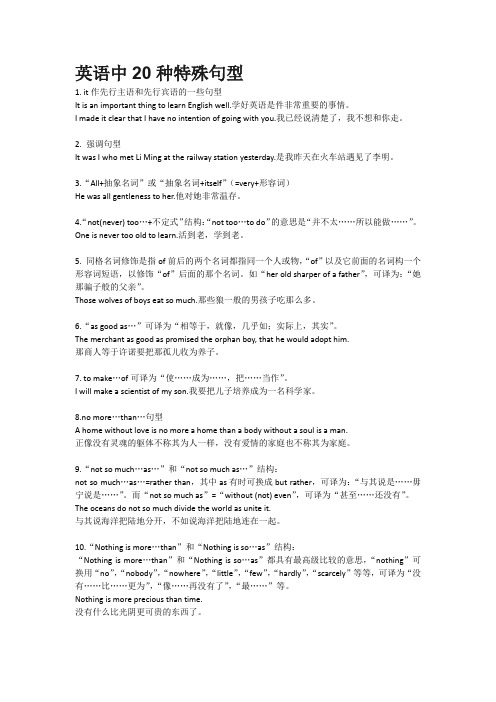
英语中20种特殊句型1. it作先行主语和先行宾语的一些句型It is an important thing to learn English well.学好英语是件非常重要的事情。
I made it clear that I have no intention of going with you.我已经说清楚了,我不想和你走。
2. 强调句型It was I who met Li Ming at the railway station yesterday.是我昨天在火车站遇见了李明。
3.“All+抽象名词”或“抽象名词+itself”(=very+形容词)He was all gentleness to her.他对她非常温存。
4.“not(never) too…+不定式”结构:“not too…to do”的意思是“并不太……所以能做……”。
One is never too old to learn.活到老,学到老。
5. 同格名词修饰是指of前后的两个名词都指同一个人或物,“of”以及它前面的名词构一个形容词短语,以修饰“of”后面的那个名词。
如“her old sharper of a father”,可译为:“她那骗子般的父亲”。
Those wolves of boys eat so much.那些狼一般的男孩子吃那么多。
6.“as good as…”可译为“相等于,就像,几乎如;实际上,其实”。
The merchant as good as promised the orphan boy, that he would adopt him.那商人等于许诺要把那孤儿收为养子。
7. to make…of可译为“使……成为……,把……当作”。
I will make a scientist of my son.我要把儿子培养成为一名科学家。
8.no more…than…句型A home without love is no more a home than a body without a soul is a man.正像没有灵魂的躯体不称其为人一样,没有爱情的家庭也不称其为家庭。
百立外语美国人常用100句型笔记

句型1.don’t be so + adj 别(怎么样)...1.Don’t be so early! 别这么早!2.笨的silly [ˈsɪli] 傻的stupid [ˈstupɪd] Don’t be so silly /stupid!3.粗鲁的rude[rud] Don’t be so rude!4.调皮的naughty [ˈnɔti] Don’t be so naughty !5.谦虚的modest[ˈmɑdɪst] Don’t be so modest!恶心的disgusting [dɪsˈɡʌstɪŋ] Don’t be so disgusting!肮脏的dirty [ˈdɜrti] 黄色电影dirty movie 龌龊猥琐dirty dog Don’t be so dirty.文明的、有礼貌的、polite [pəˈlaɪt]不礼貌的、流氓的impolite [ˌɪmpəˈlaɪt] Don’t be so impolite !句型2. Don’t + v 别(做什么)6.触碰触摸touch [tʌtʃ] Don’t touch me!7.担心worry [ˈwɜri] Don’t worry about me!8.错过错失miss Don’t miss the bus!9.浪费waste [west] Don’t waste time/ money.10.欺骗cheat[tʃit] Don’t cheat me!句型3.Allow[əˈlaʊ] me to do sth 允许我去做某事11.介绍introduce [ˌɪntrəˈdju:s] Allow me to introduce myself,please.12.解释explain [ɪkˈsplen] Please allow me to explain to you.别误会我Don’t get me wrong .13.开放、打开open You are open! 你好开放呀!Please allow me to open the windows.14.离开leave一小会a moment / a whileAllow me to leave for a while.15.犯错误make mistake Allow me to make mistakes.16.Allow me to sing a song for you.17.Allow me to have a try.18.玩游戏play game 玩耍have funAllow me to play games/have fun 句型4. what do you think of sth /doing sth 你认为 ...怎么样19.What do you think of this movie? 你认为这部电影怎么样?What do you think of watching movie ?你认为看电影怎么样?20.What do you think of Spanish [ˈspænɪʃ]?你认为西班牙语怎么样?What do you think of studying Spanish ?你认为学西班牙语怎么样?21.What do you think of fish ? 你认为鱼怎么样?What do you think of having fish ? 你认为吃鱼怎么样?22. What do you think of shopping ? 你认为购物怎么样?What do you think of going shopping ? 你认为去购物怎么样?23 . What do you think of this seat?你认为这个座位怎么样?What do you think of taking this seat ?你认为做这个座位怎么样?句型5. why not do sth ?为什么不(做)?24.Why not have some medicine? 为什么不吃些药?Pill[pɪl] 药丸25.Why not take an injection?[ɪnˈdʒɛkʃən] 为什么不打一针呢?26.Why not have a try ?为什么不试一试curiosity [ˌkjʊriˈɑsəti]好奇心27.Why not give up English? 为什么不放弃英语?28.Why not give me a call?为什么不给我打电话Why do i want give you? 我为什么要给你打电话29.Why not save some money?为什么不节省些钱呢?30.Why not join us? 为什么不加入我们?加入团队用join in句型6.I’d like to do sth 我想要(做什么)I’d=I would 比较委婉的说法句型7.I want to do sth .我想要(做什么)简单粗暴粗鲁31.I would like to have English class. 我想上英语课。
四年级英语常见句型
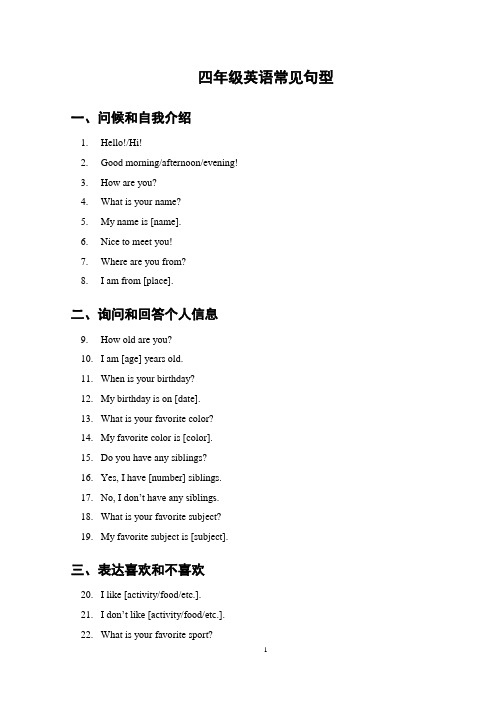
四年级英语常见句型一、问候和自我介绍1.Hello!/Hi!2.Good morning/afternoon/evening!3.How are you?4.What is your name?5.My name is [name].6.Nice to meet you!7.Where are you from?8.I am from [place].二、询问和回答个人信息9.How old are you?10.I am [age] years old.11.When is your birthday?12.My birthday is on [date].13.What is your favorite color?14.My favorite color is [color].15.Do you have any siblings?16.Yes, I have [number] siblings.17.No, I don’t have any siblings.18.What is your favorite subject?19.My favorite subject is [subject].三、表达喜欢和不喜欢20.I like [activity/food/etc.].21.I don’t like [activity/food/etc.].22.What is your favorite sport?23.My favorite sport is [sport].24.Do you enjoy reading?25.Yes, I enjoy reading.26.No, I don’t e njoy reading.27.What is your favorite book?28.My favorite book is [book title].四、谈论学校和课程29.What grade are you in?30.I am in grade [grade].31.What do you learn in school?32.I learn [subjects].33.Who is your favorite teacher?34.My favorite teacher is [teacher’s name].35.What is your favorite school activity?36.My favorite school activity is [activity].五、询问和回答关于家庭的问题37.How many people are there in your family?38.There are [number] people in my family.39.Do you live with your parents?40.Yes, I live with my parents.41.No, I live with my grandparents.42.What does your father/mother do?43.My father/mother is a [occupation].44.Who is your best friend?45.My best friend is [name].六、购物和点餐46.How much is this?47.It is [price].48.Can I try it on?49.Yes, of course.50.Can I have a menu, please?51.What would you like to order?52.I would like [dish].53.Is there a vegetarian option?54.Can I pay by credit card?七、时间和日期55.What time is it?56.It is [time].57.What day is it today?58.Today is [day].59.When is your vacation?60.My vacation starts on [date].61.What time do you wake up?62.I wake up at [time].以上是四年级英语中常见的句型,掌握这些句型可以帮助孩子们更好地进行简单交流和表达自己的想法。
四年级英语句型转换练习20题
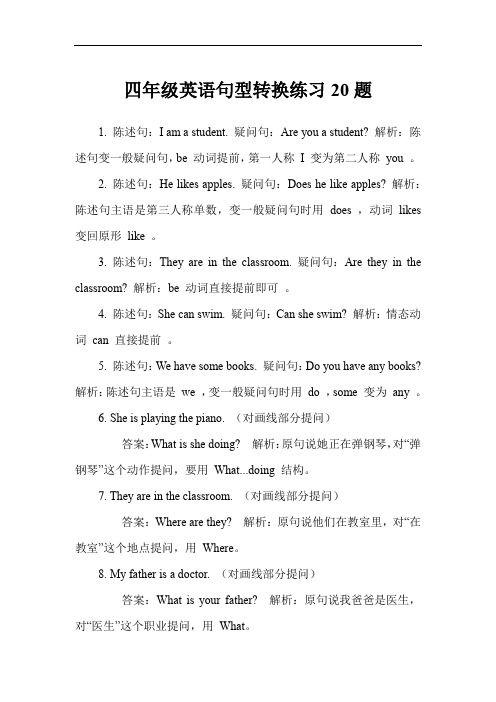
四年级英语句型转换练习20题1. 陈述句:I am a student. 疑问句:Are you a student? 解析:陈述句变一般疑问句,be 动词提前,第一人称I 变为第二人称you 。
2. 陈述句:He likes apples. 疑问句:Does he like apples? 解析:陈述句主语是第三人称单数,变一般疑问句时用does ,动词likes 变回原形like 。
3. 陈述句:They are in the classroom. 疑问句:Are they in the classroom? 解析:be 动词直接提前即可。
4. 陈述句:She can swim. 疑问句:Can she swim? 解析:情态动词can 直接提前。
5. 陈述句:We have some books. 疑问句:Do you have any books? 解析:陈述句主语是we ,变一般疑问句时用do ,some 变为any 。
6. She is playing the piano. (对画线部分提问)答案:What is she doing? 解析:原句说她正在弹钢琴,对“弹钢琴”这个动作提问,要用What...doing 结构。
7. They are in the classroom. (对画线部分提问)答案:Where are they? 解析:原句说他们在教室里,对“在教室”这个地点提问,用Where。
8. My father is a doctor. (对画线部分提问)答案:What is your father? 解析:原句说我爸爸是医生,对“医生”这个职业提问,用What。
9. I have a new book. (对画线部分提问)答案:What do you have? 解析:原句说我有一本新书,对“一本新书”提问,用What...have 结构。
10. He likes apples. (对画线部分提问)答案:What does he like? 解析:原句说他喜欢苹果,对“苹果”提问,用What...like 结构。
三年级下册M1-M10重点句型和短语
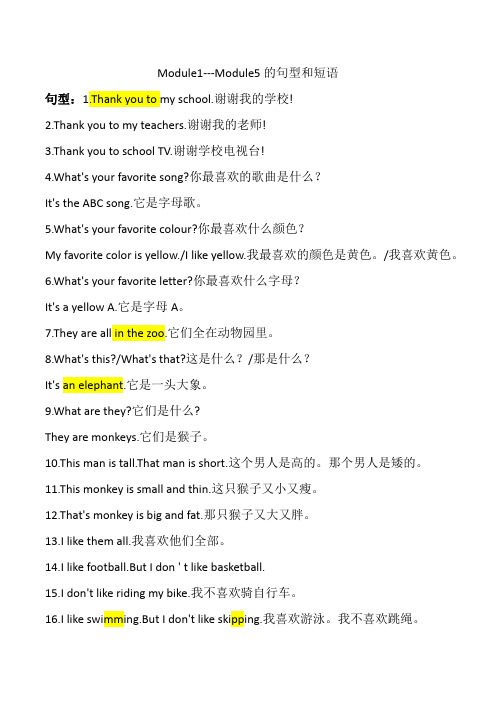
Module1---Module5的句型和短语句型:1.Thank you to my school.谢谢我的学校!2.Thank you to my teachers.谢谢我的老师!3.Thank you to school TV.谢谢学校电视台!4.What's your favorite song?你最喜欢的歌曲是什么?It's the ABC song.它是字母歌。
5.What's your favorite colour?你最喜欢什么颜色?My favorite color is yellow./I like yellow.我最喜欢的颜色是黄色。
/我喜欢黄色。
6.What's your favorite letter?你最喜欢什么字母?It's a yellow A.它是字母A。
7.They are all in the zoo.它们全在动物园里。
8.What's this?/What's that?这是什么?/那是什么?It's an elephant.它是一头大象。
9.What are they?它们是什么?They are monkeys.它们是猴子。
10.This man is tall.That man is short.这个男人是高的。
那个男人是矮的。
11.This monkey is small and thin.这只猴子又小又瘦。
12.That's monkey is big and fat.那只猴子又大又胖。
13.I like them all.我喜欢他们全部。
14.I like football.But I don ' t like basketball.15.I don't like riding my bike.我不喜欢骑自行车。
16.I like swimming.But I don't like skipping.我喜欢游泳。
雅思大作文模板之20种经典开头句型
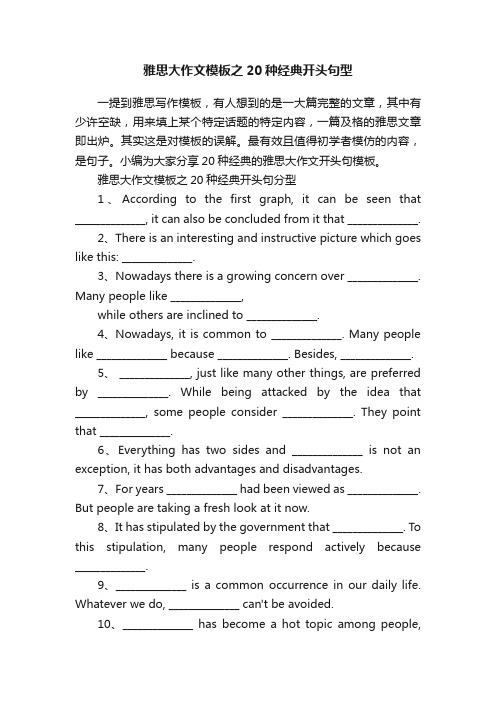
雅思大作文模板之20种经典开头句型一提到雅思写作模板,有人想到的是一大篇完整的文章,其中有少许空缺,用来填上某个特定话题的特定内容,一篇及格的雅思文章即出炉。
其实这是对模板的误解。
最有效且值得初学者模仿的内容,是句子。
小编为大家分享20种经典的雅思大作文开头句模板。
雅思大作文模板之20种经典开头句分型1、According to the first graph, it can be seen that ______________, it can also be concluded from it that ______________.2、There is an interesting and instructive picture which goes like this: ______________.3、Nowadays there is a growing concern over ______________. Many people like ______________,while others are inclined to ______________.4、Nowadays, it is common to ______________. Many people like ______________ because ______________. Besides, ______________.5、 ______________, just like many other things, are preferred by ______________. While being attacked by the idea that ______________, some people consider ______________. They point that ______________.6、Everything has two sides and ______________ is not an exception, it has both advantages and disadvantages.7、For years ______________ had been viewed as ______________. But people are taking a fresh look at it now.8、It has stipulated by the government that ______________. To this stipulation, many people respond actively because ______________.9、______________ is a common occurrence in our daily life. Whatever we do, ______________ can't be avoided.10、______________ has become a hot topic among people,especially among the young, and heated debates are right on their way.11、Recently, ______________ has become the focus of the society, and in this way.. People swarm to ______________.12、______________ has been playing an increasingly important role in our day-to-day life. It has brought us a lot of benefits but created some serious problems as well.13、Man is now facing a big problem-______________, which is becoming more and more serious. First, ______________ second, ______________.14、Nowadays more and more people are beginning to be aware of the seriousness of ______________.15、It is only during the last years that man has become generally aware that ______________.16、There is an old saying, ______________. It's the experience of our forefathers, however, it is correct in many cases ever today.17、The English proverb says, ______________. This is quite true because ______________.18、______________ is now______________, and at the same time ______________. These two factors have caused ______________. Then what shall we do to solve ______________ in the face of such a situation.19、One of our ancient philosophers said, ______________. Chinese people have always been holding this idea to be one of their standards of morality.20、One of the great early writers said that ______________. If this is true, the present situation should make us ponder over ______________.雅思大作文:the old age is more valued , while in some cultures the youth is more valued雅思大作文题目:In some cultures, the old age is more valued (valuable), while in some cultures the youth is more valued (more useful). Discuss both views and give your opinion.Give reasons for your answer and include any relevant examples from your own knowledge or experience.作文范文:There have been drastic and constant changes of societies and values in the global context for recent decades. Therefore, some traditional cultures regard old age valuable for their civilization whereas other utilitarian ones may deem the youth, energetic and willing to accept challenges, to more precious.What the senior brings about to all areas is mainly experience and the sense of security to all. It is well acknowledged that the aged, whichever field they have served, have accumulated more knowledge and skills out of years practice. They may thus grasp some principles that can be utilized in guiding the next generation to cope with matters and, even having undergone modern technological revolutions, ought to be applicablein most cases. Apart from this apparent benefit, another must not be neglected. Everyone without exception goes through the aging process and it is not hard to imagine what it would be like if a society viewed the elderly to be useless and exerted little of its resources in supporting them. Nothing could alleviate the anxiety of the middle-aged and even young adults about their retirement benefits and eventually fade away the sense of security, followed by some possible increase of crime rate.Cultures think high of the youth, however, can see benefits on social production and renovations. In the first place, the youth are generally way more dynamic, which offer sufficient labor force to carry out productive activities, and if a greater rewardand respect can be given and shown to them, this force can be more active and rewarding in return. Moreover, they generally and more quickly can embrace changes in work and life. This indicates the removal of obstacles in implementing challenging policies, promoting certain businesses, developing new technologies, and boosting economy afterwards within a relatively short period.To my mind, a justifiable government should keep the balance between the pension for the past devotion of the elder and the incentive for the current contribution from the young, to realize social justice and security.雅思大作文:the world of work is changing rapidly雅思大作文题目:The world of work is changing rapidly and people cannot depend on the same job or same conditions of work for life. Discuss the possible causes for this rapid change and give your suggestions on how people should prepare for work in the future?Give reasons for your answer and include any relevant examples from your own knowledge or experience.作文范文:In my country, people used to be constrained to a single workplace for lifelong by social security or welfare system. However, this is no longer the case nowadays when people are free to choose their occupation or have to adapt themselves in different positions.People now change their works and environment based on several reasons, subjectively and objectively. To pursue a better career or break through a bottleneck, rather than secure a stable income, young people usually opt to change their job. In addition, graduates with little working experience have not developed a clear perspective of their life career. It is reasonable for them tobe exposed to various workplaces, orienting to the society and trying to find out their strengths and interests. On the negative side, employers have to qualify themselves every couple of years, or else they may get fired and are forced to get other positions. This is because modern technologies have been revolutionizing since the advent of computer and internet and employers from different industries have to adopt the radically changing needs of the market. They thus must recruit those with advanced skills and specialties and cast out those left behind in order to meet the demand.For better future career and greater possibilities of being always employed, people can take the following pieces of advice. It is certainly feasible that people exert their lifelong time in acquiring new knowledge and skills. This is especially true and cruel for the veteran workers who may find their specialized knowledge outdated comparing to that brought by the fresh and even new graduates. It is only a matter of attitude of being studious and diligent, otherwise laziness would eventually take its toll. Another piece of suggestion is to stand on solid ground before a job-hop and a promotion, which is mainly aiming at those regarding themselves already fully-prepared to get higher position. If one’s strong sense of responsibility is not fostered, maturity not or ability to tackle problems not developed, the newly-promoted will suffer from both disobedience of reports and doubts of bosses.To sum up, the swift shifting societies offer people less chance to stay vocationally unchanged. Therefore, the path of a successful career would be more even if one is willing to tgeready and embrace.雅思大作文:the family have a powerful influence on children's life雅思大作文题目:Although the family have a powerful influence on children 's life, the influence outside from home isa bigger part for his/her development. To what extent do you agree or disagree?Give reasons for your answer and include any relevant examples from your own knowledge or experience.作文范文:It is known to people from both western and eastern world that some certain features always run within each family, unlikely to alter even after people have become independent from the original family for long. Therefore, I hardly agree with the indication that the life outside from family has greater impact for people.Schooling and social experience undeniably affect peoplein various aspects. The most obvious one lies in the environment in whichschool students and social persons have more chances to acquire more knowledge and gain richer experience because of far more sources of input, from friends, teachers, bosses, colleagues, acquaintances and even strangers. People thus have to foster a variety of relationships and learn to cope with them skilfully. With extensive knowledge and harmonious relationships, a better development maybe maintained and furthered.However, the family education, or parenting to be exact, turns out to be more profound and root. In the pursuit of knowledge, one has to foster habits like being able to concentrate and to expand quality attention span at the very beginning of school years. These are required by school authorities and sadly and generally realized at home as teachers can only focus on the overall performance of the class rather than each very individual. Some may argue about private sectors andthat leads to the second point, the power of money. The amount of resources that one can utilize not only decide the standard of living, which may support private tutoring for better learning habits but also may formulate his or her value towards wealth, which in the long run, intentionally or unexpectedly is passed to the offspring. As well as that, child ren’s value towards people, right and wrong and even goal of life is deeply affected.In conclusion, I don’t agree with the opinion that others factors influence more than family itself as the value is formed there and it can be recognized in nearly all aspects in the later part of life.雅思大作文模板之20种经典开头句分型。
There be 的20个句型
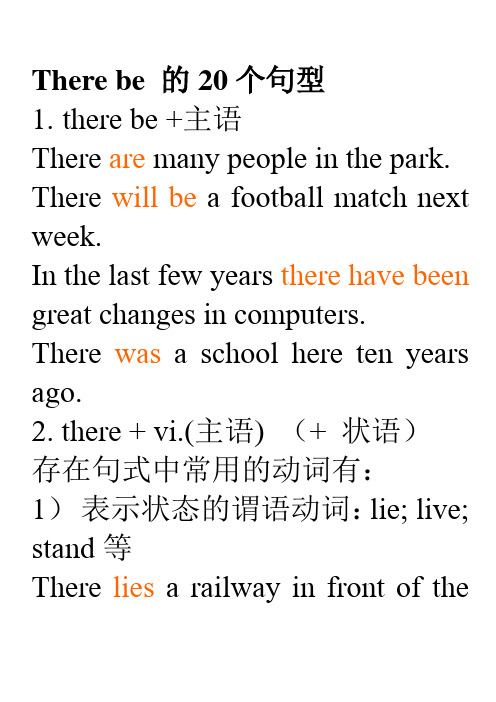
There be 的20个句型1.there be +主语There are many people in the park. There will be a football match next week.In the last few years there have been great changes in computers.There was a school here ten years ago.2. there + vi.(主语) (+ 状语)存在句式中常用的动词有:1)表示状态的谓语动词:lie; live; stand等There lies a railway in front of thevillage.2)表示发生或到达等意义的动词:come; go; rise;follow; enter等There comes a red car!There runs a river in the distance.远处有一条河。
Suddenly there entered a woman asking for help.走进来一位妇女求救。
3. There is +主语+ doingThere are very few people living there.There is a car waiting outside. There is a wallet lying on theground.4. There is + 主语+ doneThere were no trees left in or around the village.There is a man killed in the room.房间里有个人被杀。
There is a boy knocked down by a bus.5. There is + 主语+ to doThere is nothing to worry about.[表即将发生的动作]There are many problems to solve/to be solved.有许多问题需要解决。
人教版初中英语语法点

人教版初中英语语法点以下为您提供 20 个人教版初中英语的相关知识点:1. 语法点:一般现在时- 英语释义:The present simple tense is used to talk about habitual actions, facts, and general truths.- 短语:often, usually, sometimes, always- 单词:go, come, do, have- 用法:主语 + 动词原形(当主语是第三人称单数时,动词加s/es)- 双语例句:I often go to school by bike. (我经常骑自行车上学。
)He always gets up early. (他总是起得很早。
)2. 语法点:现在进行时- 英语释义:The present continuous tense is used to describe an action that is happening at the moment of speaking.- 短语:now, at the moment- 单词:read, write, listen, watch- 用法:主语 + am/is/are + 动词 -ing- 双语例句:I'm reading a book now. (我现在正在读一本书。
)They are playing football at the moment. (他们此刻正在踢足球。
)3. 语法点:一般过去时- 英语释义:The past simple tense is used to talk about actions or events that happened in the past and are now finished.- 短语:yesterday, last week, ago- 单词:go - went, do - did, have - had- 用法:主语 + 动词过去式- 双语例句:I went to Beijing last year. (我去年去了北京。
高考英语考点 20基数词
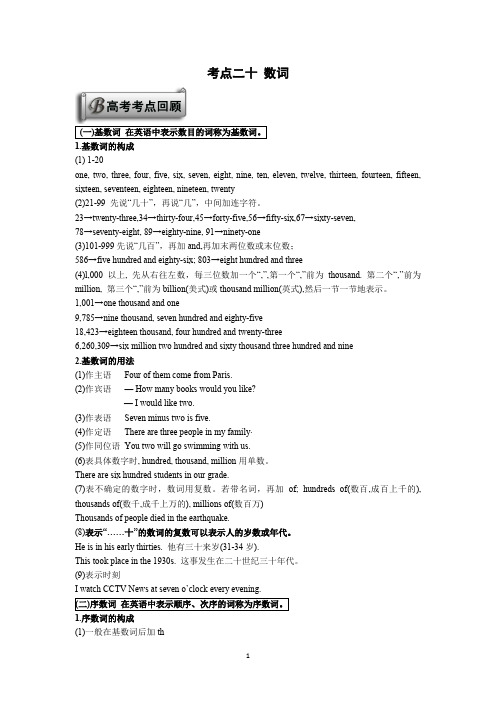
考点二十数词(一)基数词在英语中表示数目的词称为基数词。
four→fourth, thirteen→thirteenth(2)不规则变化one→first, two→second, three→third, five→fifth, eight→eighth, nine→ninth, twelve→twelfth (3)以y结尾的十位整数,变y为i再加ethtwenty→twentieth, forty→fortieth, ninety→ninetieth(4)从二十一后的“几十几”直至“几百几十几”或“几千几百几十几”只将个位的基数词变为序数词。
twenty-first, two hundred and forty-fifth2.序数词的用法(1)序数词作定语时,一般要与定冠词或物主代词连用。
Tom is their second son. He is the first one to come here.(2)序数词有时可与不定冠词连用,表示数量上“又—”,“再一”He tried a second time.他又试了—次。
Shall l ask him a third time? 还要我再问他—次吗?我已问了他两次。
(3)序数词的缩写形式为:阿拉伯数字加上这个词的末尾两个字母。
1st, 2nd, 3rd, 4th, 20th, 21st, 22nd, 23rd(4)表示年、月、日时,年用基数词,日用序数词。
2005年8月15日:(英)15,8,2005=15th, August, 2005;(美)8,15,2005 = August 15th, 2005 (三)基数词和序数词都可以用来给数字编号。
No.1(1号), No.3bus(3路公共汽车), Room 103,(103号房间) the second lesson(四)分数词的表达分子用基数词,分母用序数词,分子大于1时,分母加s。
1/3-one third; 2/5-two fifths(五)数学运算的表达3+5=8. Three plus/and five is eight.9-2=7. Nine minus two is seven.6x5=30. Five times six is thirty.8÷2=4. Eight divided by two is four.(六)英语中表达倍数常用下列句型:1. A is three / four...times the size / height / length / width...of B.2. A is three / four...times as big / high / long / wide...as B.3. A is three / four...times bigger / higher / longer / wider...than B.用times表示倍数时,一般只限于三倍或三倍以上的数,表示两倍常用twice或double。
新概念英语第二册课后练习答案(1-20)
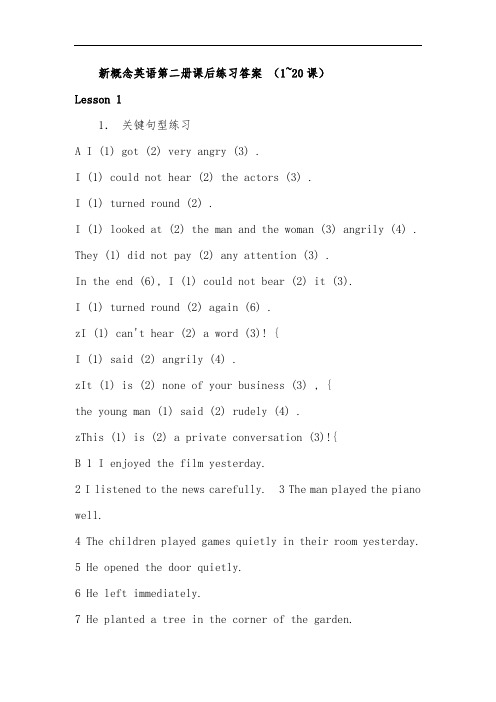
新概念英语第二册课后练习答案(1~20课)Lesson 11.关键句型练习A I (1) got (2) very angry (3) .I (1) could not hear (2) the actors (3) .I (1) turned round (2) .I (1) looked at (2) the man and the woman (3) angrily (4) . They (1) did not pay (2) any attention (3) .In the end (6), I (1) could not bear (2) it (3).I (1) turned round (2) again (6) .zI (1) can't hear (2) a word (3)! {I (1) said (2) angrily (4) .zIt (1) is (2) none of your business (3) , {the young man (1) said (2) rudely (4) .zThis (1) is (2) a private conversation (3)!{B 1 I enjoyed the film yesterday.2 I listened to the news carefully.3 The man played the piano well.4 The children played games quietly in their room yesterday.5 He opened the door quietly.6 He left immediately.7 He planted a tree in the corner of the garden.8 He read the letter quickly in his office before lunch.9 I borrowed a book from the library this morning.10 The cook spoilt the soup.11 We stay at home on Sundays.12 There are a lot of people at the bus stop.13 The little boy ate greedily an apple in the kitchen this morning.14 She draws beautifully.15 I like music very much.16 They built a new school in our village last year.17 The match ended at four o'clock.18 She received a letter from her brother last week. 2.多项选择题答案1 b2 c3 b4 d5 c6 a7 d 8 b 9 a 10 c 11 c 12 cLesson 22.难点练习答案1 What a wonderful garden(this is) !2 What a surprise( this is) !3 What a lot of trouble he is causing!4 What wonderful actors (they are) !5 What a hard-workingwoman (she is) !6 What a tall building (it is) !7 What a terrible film (it is) !8 What a clever boy you are!9 What a pretty girl (she is) !10 What a strange guy (he is) !3.多项选择题答案1 c2 d3 c4 c5 a6 b7 b 8 a 9 d 10 c 11d 12 bLesson 31.关键句型练习题A went (1.1)Õvisited (1.2) Õsat(1.2) Õtaught(1.2)ÕlentÕread(1.3) Õdid notunderstandÕthought (1.4)Õpassed (1.5) Õdid not send(1.5) ÕmadeÕgo up (1.6) Õbought (1.7) Õspent(1.7) Õdid not write(1.8)C ...Roy died last year…left me…spent a lotof money…bought one or two…never went to the cinema…stayed at home…listened tomusic…often lent CDs…they kept them…lost many CDs… 2.难点练习题1 He paid some money to the shopkeeper.2 He handed the prize to me.3 The waiter brought the man a bottle of beer.4 He sold me all his books.5 The shop assistant found me some curtain material.6 He did a big favour for me.7 She showed her new hat to her husband.8 She promised the finder a reward.9 He gave some advice to his son.10 His uncle left some money to/ for him.11 He is teaching us English.12 I bought you this bunch of flowers.13 Bring me that book please.14 He offered a cigarette to me.15 Read the first paragraph to me.16 I've ordered you some soup.17 I owe a lot of money to him.18 Pass your father the mustard.3.多项选择1c 2a 3c 4a 5d 6b7c 8c 9b 10a 11b 12bLesson 121.关键句型练习答案A will sail (1.1); shall meet (1.2); will be (1.3); will set out (11.4-5); shall have(1.5); shallsee (1.5); shall say (1.6);will be (1.6); will take part (1.7) C I shall go to the theatre Reg and I shall see the first performance the producer will give a short speech. He will speak to The play will bevery people will enjoy it very much.2.难点练习答案1 He is not back yet. He will be back in ten minutes.2 A new play is on at the Globe Theatre.3 When the concert was over, We went home.4 They will set out/ off very early tomorrow morning. (Here be off is also possible.)5 You can't take the exam yet. You are not up to it.6 He will be away from home for two months.7 She swam across the English Channel and set up a new world record.3.多项选择题答案1 c2 c3 a4 d5 d6 a7 d 8 a 9 c 10 d 11 a 12 aLesson 131.关键句型练习答案A will be arriving (1.2); will be coming (1.3); will be meeting(1.4); will be singing (1.5);will be staying (1.6); will be trying (1.8)C 1 I'll be ironing the clothes.2 The train will be arriving in a few minutes.3 We'll be seeing you in the morning.4 We'll be watching the match.5 He'll be correcting exercise books.2.难点练习答案1 It's George's.2 It's Jean's.3 It's that woman's.4 I like Keats' poetry best.5 They're the children's.6 They're the soldiers'.7 I'll leave in six hours time. 8 There was a hundred pounds' worth of damage.3多线选择答案1 b2 d3 b4 c5 a6 bLesson 141.关键句型练习答案A 1 I drove on to the next town after I had left a small village.2 I said good morning to him in French as soon as he had got into the car.3 I had nearly reached the town, when the young man said: BDo you speak English?C 1 After she had written the letter, she went to the post office.2 After he had had dinner, he went to the cinema.3 When I had fastened my seat belt, the plane took off.4 We did not disturb him until he had finished work.5 As soon as he had left the room, I turned on the radio.6 He had been very ill before he died.D 1 regretted 2 had begun/ began 3 arrived2.难点练习答案1 Except for2 both of3 Apart from4 askedlask for5 neither oflasked3.多项选择答案1 b2 c3 a4 c5 d6 bLesson 151. 关键句型练习答案A 1a The secretary told me that Mr. Harmsworth would see me. bcMr. Harmsworth will see you. d2 a Mr. Harmsworth said that business was very bad.b cBusiness is very bad.d3 a Mr. Harmsworth told me that the firm could not afford to pay such large salaries.b cThe firm cannot afford to pay such large salaries. dB 1 told would come/would be coming2 said (had) cut3 told had never played4 did he say had done/would do5 did he tell (had) bought/would buy6 said could not7 said (had) worked8 told wrote/writes/had never written9 did you say were/had been10 said would wait2.难点练习答案1 study2 office3 nervous4 afford5 irritable3.多线选择答案1d 2b 3c 4b 5c 6d7a 8d 9c 10c 11c 12bLesson 201关键句型练习答案A Fishing(1.1); catching(11.1-2); catching(1. 3); having spent(1.5); fishing(1.6);fishingˆ sitting(1.8); doing (1.9) C 1 he went out of the restaurant without paying the bill.2 She bought a pair of boots instead of getting a pair of shoes.3 She was afraid of spending the night alone.4 After hearing/having heard the news, she fainted.5 Think carefully before answering my question.6 On seeing the plane coming towards me, I dashed for cover. 2难点练习答案1realized 2It'sˆunderstandˆits 3exciting 4interesting 5exciting 6interested3多项选择答案1b 2c 3b 4b 5c 6b新概念英语第二册课后习题答案详解Lesson 21练习答案Key to written exercises 1.关键句型练习答案A …passing planes can be heard(1.2); The airport was built (1.2); it co uld not be used then(1. 3); a hundred people must have been driven away(11.4-5); this house will be knocked down by a passing plane(11 .6-7); I have been offered a large sum of money(1.7)C 1 A message will be sent immediately. 2 All these goods must be sold.3 I told you the parcel would be received in time.4 The letter h as to be delivered by hand.5 Your letter must have been lost In the post. 2.难点练习答案 A (sample answers)The dog drove the sheep out of the field. The police drove the cro wds back. I drove my car into the garage. B1 home 2 houses 3 house 4 home 3.多项选择题答案1. c根据课文第3-4行Last year, however, it came into use, 只有c. came into use recently 比较接近课文的实际容,而其他3个选择都不符课文容。
英语五大句型例句每种20个例句
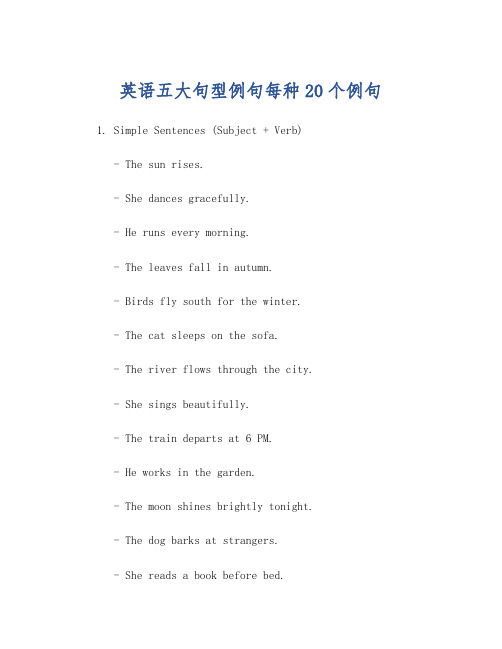
英语五大句型例句每种20个例句 1. Simple Sentences (Subject + Verb)- The sun rises.- She dances gracefully.- He runs every morning.- The leaves fall in autumn.- Birds fly south for the winter.- The cat sleeps on the sofa.- The river flows through the city.- She sings beautifully.- The train departs at 6 PM.- He works in the garden.- The moon shines brightly tonight.- The dog barks at strangers.- She reads a book before bed.- The wind blows gently.- He swims in the ocean.- The flowers bloom in spring.- She cooks dinner for the family.- The car accelerates quickly.- He walks to the store.- The rain falls softly.- The clock ticks loudly.2. Compound Sentences (Subject + Verb + Object) - I read a book about history.- She enjoys eating chocolate.- He plays the piano every evening.- They watch movies on weekends.- The children love playing in the park.- She hates getting up early.- He studies hard for his exams.- The birds eat seeds from my hand.- She listens to music while working.- The teacher assigns homework daily.- He buys groceries on his way home.- The students write essays for class.- She chooses a red dress for the party.- He catches the ball with ease.- The dog fetches the stick.- She opens the door for me.- The wind carries the scent of flowers.- He finds joy in helping others.- The waves crash against the shore.- She paints a picture of the sunset.- The children receive gifts for Christmas.3. Complex Sentences (Subject + Verb + Object +Subordinate Clause)- I will call you when I arrive.- She will be happy if you visit her.- He is reading a book that I recommended.- The cat sleeps where it's warm.- The students will pass the test if they study. - She sings loudly because she is excited.- He is a great athlete despite his age.- The flowers bloom when the weather is warm.- She cooks dinner while the children play.- The train is late because of the storm.- He will succeed if he works hard.- The moon is bright even though it's cloudy.- The dog barks whenever it hears a noise.- She smiles because she is happy.- The wind blows harder as the storm approaches.- He swims faster than anyone else in the team.- The flowers wilt after the rain.- She cries because she is sad.- The car stops when the light turns red.- He feels proud because he finished the race.4. Compound-Complex Sentences- I will call you after I finish my work, and then we can go out for dinner.- She enjoys painting and often spends her weekends in the studio.- He plays the guitar, and his brother plays the drums.- The children play outside, but they come in whenit's dark.- She hates getting up early, so she sets her alarmfor the latest possible time.- He studies hard for his exams, and as a result, he always gets good grades.- The birds eat seeds from my hand, which is why theycome to my garden.- She listens to music while working, and it helps her concentrate.- The teacher assigns homework daily, but the students still enjoy their classes.- He buys groceries on his way home, and he always picks up something special for me.- The students write essays for class, and they learn a lot from the process.5. Sentences with Non-Finite Verbs (Gerunds and Infinitives)- Reading is a great way to relax.- She loves playing the violin.- He stopped to admire the view.- The children enjoy playing games.- I prefer watching movies to reading books.- She hates being woken up early.- He dreams of traveling the world.- The cat dislikes being disturbed while sleeping.- She stopped to listen to the music.- The students are excited about learning new things. - He is good at solving complex problems.- The flowers need watering regularly.- She is considering changing her career.- He is capable of achieving great things.- The dog is trained to fetch the ball.- She is fond of collecting stamps.- The wind is strong enough to move the leaves.- He is interested in learning a new language.- The children are eager to start their summer vacation.。
新概念1 重点句型

60. Can you find them?
你能找到他们吗?
61. The kettle’s boiling.
水开了。
62. Can she type a letter for me?
她能为我打一封信吗?
63. Ask her please.
请问问她。
64. I can’t read it.
新概念1重点句型
Lesson1--50
译文
1.Excuse me!
对不起,打扰一下。
2.Pardon?
对不起,请再说一遍。
3.Is this your handbag?
Yes, it is. No, it isn’t.
这是你的手提包吗?
是,它是。不,它不是。
4.Thank you very much.
在天空中飘着几朵云,但阳光明媚。
46. Sally is looking at a big ship.
Sally正看着一艘大轮船。
47. Here is another photograph of our village.
这是另一张我们村庄的照片。
48. He is swimming across the river.
太阳升得早,却落得晚。
The sun rises early, and sets late.
Sawyer一家住在国王街87号
The Sawyers live at 87 King Street.
早上,Sawyer先生去上班,孩子们去上学。
In the morning, Mr. Sawyer goes to work and the children go to school.
雅思口语part1常用句型20句
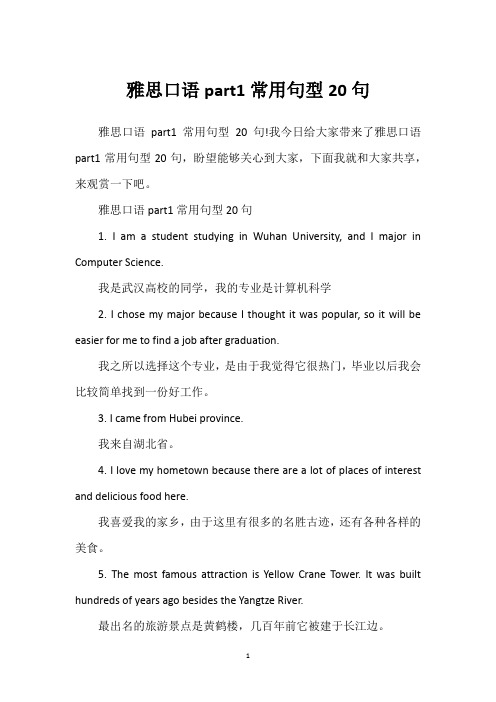
雅思口语part1常用句型20句雅思口语part1常用句型20句!我今日给大家带来了雅思口语part1常用句型20句,盼望能够关心到大家,下面我就和大家共享,来观赏一下吧。
雅思口语part1常用句型20句1. I am a student studying in Wuhan University, and I major in Computer Science.我是武汉高校的同学,我的专业是计算机科学2. I chose my major because I thought it was popular, so it will be easier for me to find a job after graduation.我之所以选择这个专业,是由于我觉得它很热门,毕业以后我会比较简单找到一份好工作。
3. I came from Hubei province.我来自湖北省。
4. I love my hometown because there are a lot of places of interest and delicious food here.我喜爱我的家乡,由于这里有很多的名胜古迹,还有各种各样的美食。
5. The most famous attraction is Yellow Crane Tower. It was built hundreds of years ago besides the Yangtze River.最出名的旅游景点是黄鹤楼,几百年前它被建于长江边。
6. Every year millions of tourists visit the tower coming from different parts of China.每年都有几百万来自于全国各地的游客参观黄鹤楼。
7. And the most welcomed snack is the hot dry noodle, even though some outlanders do not appreciate it at the beginning, they will love it finally.最受欢迎的小吃是热干面,虽然有一些外地来的人刚开头并不喜爱吃,但是一段时间以后他们肯定会爱上热干面。
英语写作高分句型
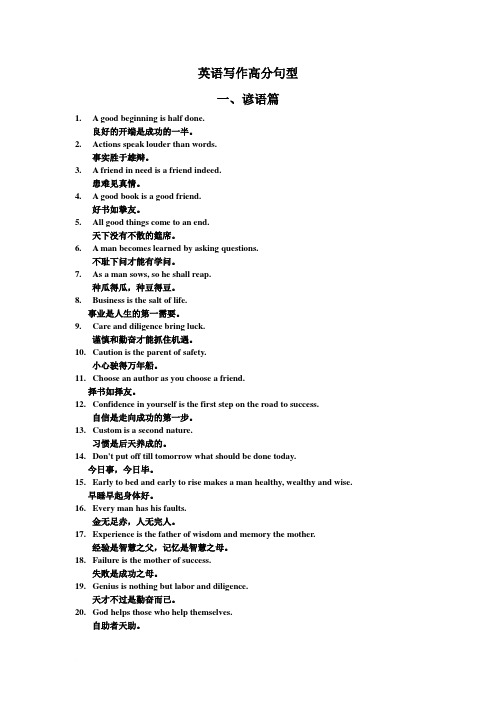
英语写作高分句型一、谚语篇1. A good beginning is half done.良好的开端是成功的一半。
2.Actions speak louder than words.事实胜于雄辩。
3. A friend in need is a friend indeed.患难见真情。
4. A good book is a good friend.好书如挚友。
5.All good things come to an end.天下没有不散的筵席。
6. A man becomes learned by asking questions.不耻下问才能有学问。
7.As a man sows, so he shall reap.种瓜得瓜,种豆得豆。
8.Business is the salt of life.事业是人生的第一需要。
9.Care and diligence bring luck.谨慎和勤奋才能抓住机遇。
10.Caution is the parent of safety.小心驶得万年船。
11.Choose an author as you choose a friend.择书如择友。
12.Confidence in yourself is the first step on the road to success.自信是走向成功的第一步。
13.Custom is a second nature.习惯是后天养成的。
14.Don't put off till tomorrow what should be done today.今日事,今日毕。
15.Early to bed and early to rise makes a man healthy, wealthy and wise.早睡早起身体好。
16.Every man has his faults.金无足赤,人无完人。
17.Experience is the father of wisdom and memory the mother.经验是智慧之父,记忆是智慧之母。
七年级上册starterunit2重点句型20个
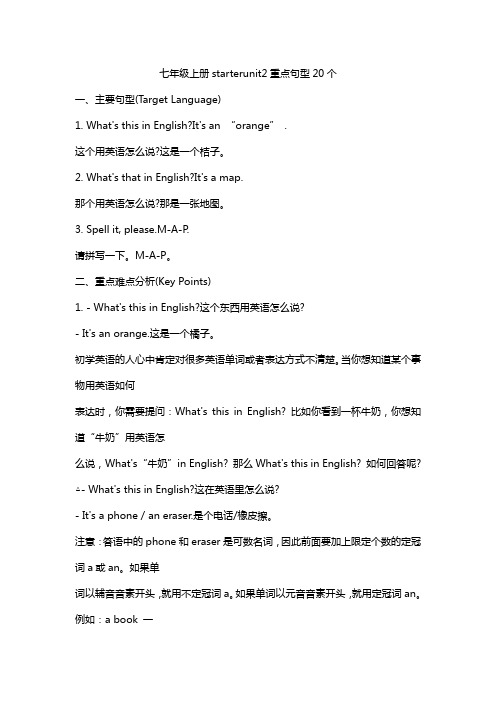
七年级上册starterunit2重点句型20个一、主要句型(Target Language)1. What's this in English?It's an “orange” .这个用英语怎么说?这是一个桔子。
2. What's that in English?It's a map.那个用英语怎么说?那是一张地图。
3. Spell it, please.M-A-P.请拼写一下。
M-A-P。
二、重点难点分析(Key Points)1. - What's this in English?这个东西用英语怎么说?- It's an orange.这是一个橘子。
初学英语的人心中肯定对很多英语单词或者表达方式不清楚。
当你想知道某个事物用英语如何表达时,你需要提问:What's this in English? 比如你看到一杯牛奶,你想知道“牛奶”用英语怎么说,What's“牛奶”in English? 那么What's this in English? 如何回答呢? △- What's this in English?这在英语里怎么说?- It's a phone / an eraser.是个电话/橡皮擦。
注意:答语中的phone和eraser是可数名词,因此前面要加上限定个数的定冠词a或an。
如果单词以辅音音素开头,就用不定冠词a。
如果单词以元音音素开头,就用定冠词an。
例如:a book 一本书,an eraser 一块橡皮。
(1)in English 表示“用英语表达”,in Chinese 则表示“用汉语表达”。
(2)What's = What is,what用来询问某物是“什么”,is是be动词一般现在时的第三人称单数形式。
(3)this“这、这个”,是指示代词,而that表示“那、那个”,it“它”,是指物的人称代词。
英语常用口语100个母句型

100个常用的英语口语母句型表达观点与看法1. I think… 我认为……- I think it's a great idea. 我认为这是个很棒的主意。
2. In my opinion… 在我看来……- In my opinion, we should go for it. 在我看来,我们应该去争取。
3. As far as I'm concerned… 就我而言……- As far as I'm concerned, it doesn't matter. 就我而言,这没关系。
4. I believe… 我相信……- I believe you can do it. 我相信你能做到。
5. It seems to me that… 在我看来似乎……- It seems to me that something is wrong. 在我看来似乎有些不对劲。
日常问候与寒暄6. How are you? 你好吗?- How are you doing? 你过得怎么样?7. What's up? 怎么了?有什么事吗?- What's new? 有什么新鲜事吗?8. Long time no see. 好久不见。
- It's been a long time. 已经很久了。
9. How's everything? 一切都好吗?- How's your day? 你今天过得怎么样?10. Nice to see you. 很高兴见到你。
- Nice to meet you. 很高兴认识你。
谈论喜好与兴趣11. I like… 我喜欢……- I like reading books. 我喜欢读书。
12. I'm interested in… 我对……感兴趣。
- I'm interested in learning English. 我对学习英语感兴趣。
- 1、下载文档前请自行甄别文档内容的完整性,平台不提供额外的编辑、内容补充、找答案等附加服务。
- 2、"仅部分预览"的文档,不可在线预览部分如存在完整性等问题,可反馈申请退款(可完整预览的文档不适用该条件!)。
- 3、如文档侵犯您的权益,请联系客服反馈,我们会尽快为您处理(人工客服工作时间:9:00-18:30)。
他是我的弟弟。
2
我,我们读7年级。
3
我非常爱他们。
4
我非常喜欢它。
5
我最喜欢的科目(老师/运动)是美术(李老师/网球)。某人最喜欢的——是——
6
别着急!慢慢来。
7
这不是我的书。我的在那边。
8
这是我的朋友吉姆(护照/卧室/一只鹦鹉)。这是——
9
那是他的书吗?不,那不是。那是——吗?
10
这些是我的朋友。这两位是我的父母。这些——是。
11
那两个是我的弟弟。那些是他的表妹。那些——是。
12
我想吃个橙子。
13Biblioteka 钥匙在抽屉里。14迈克的生日是1月21日。
15
这两位同学的家在同一栋楼里。
16
你的英语书在桌子上。
17
手表在床底下。
18
我六点钟起床。
19
聚会在晚上举行。
20
火车正从隧道穿过。
